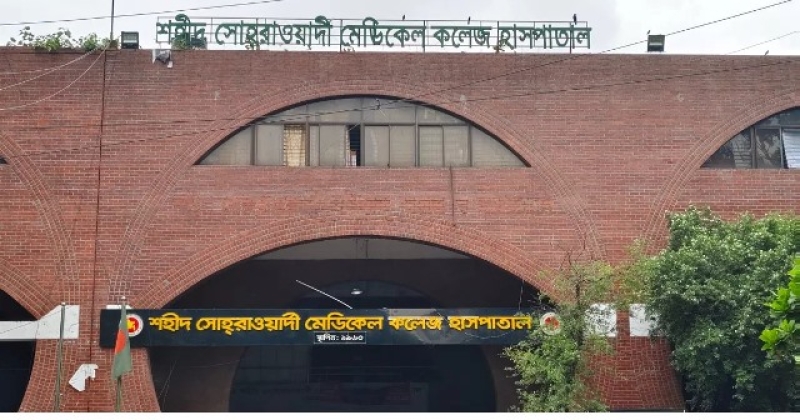- India Sees 9% Drop in Foreign Tourists as Bangladesh Visits Plunge |
- Dhaka Urges Restraint in Pakistan-Afghan War |
- Guterres Urges Action on Safe Migration Pact |
- OpenAI Raises $110B in Amazon-Led Funding |
- Puppet show enchants Children as Boi Mela comes alive on day 2 |
What happens to patients during long Eid holiday!

Shaheed Suhrawardy Medical Collee Hospital._11zon
Dhaka, April 01 (UNB) - While educational institutions, offices and banks remain closed for nine days during Eid, hospitals cannot afford such a luxury.
The question of whether patients receive the expected level of care during the holiday period and how hospitals operate under such circumstances remains a point of curiosity and concern.
A visit to several public and private hospitals in the capital reveals that almost all of them continue to accommodate a significant number of patients.
Although the presence of senior consultants is relatively low, medical officers and junior doctors are attending to patients.
Nurses and ward boys are also available to ensure continuous care.
At Shaheed Suhrawardy Medical College Hospital, around 500 patients remain admitted during Eid.
Many of them have not been discharged due to their health conditions. The absence of senior doctors and the uncertainty of their visits during Eid have left patients worried.
Ahad Mia (60), a day labourer from Habiganj, has been admitted for over a week due to kidney stones.
“The doctors have performed kidney washing, but some stones remain. The doctor advised me to stay here for Eid. So far, there has been no lack of treatment. Doctors have been visiting regularly, but I am unsure how things will go in the coming days,” he shared.
Similarly, Safed Howlader (72) from Barguna has been hospitalised for 20 days with a tumour in his bladder. His daughter, Parveen Akter (40), said, “We are receiving good service even during the holidays. However, as senior doctors are not available, the surgery may be postponed until after Eid. His condition has improved significantly.”
Regarding the reduced presence of doctors and nurses, senior staff nurse Sadhana Halder explained, “Naturally, the number of doctors and nurses is slightly lower during the Eid holidays. However, it is incorrect to assume that the hospital will be left without medical staff. An on-call doctor is always available to handle any emergency.
Non-Muslim doctors and nurses usually cover duties during Eid prayers and the afternoon hours, ensuring no major crisis occurs.”
Another senior staff nurse, Beauty Gomez, said, “Many patients voluntarily request discharge before Eid.
But, serious patients cannot be released. Tasks such as administering medication, dressing wounds, and pushing injections do not always require senior doctors. Nurses and medical officers can manage these aspects efficiently.”
The scenario at Dhaka Medical College Hospital is quite similar. While the emergency department remains active with doctors on standby, the presence of senior consultants in patient wards is noticeably lower. Shilpi Khatun (45), the wife of an admitted patient, said, “Doctors are attending to patients well, but I have heard that senior doctors will not be around. Seeing them reassures us, so their absence is a bit unsettling.”
Mishkat (28), a relative of another patient from Gopalganj, shared, “We are receiving services, but they are not up to expectations. However, I have heard that the service quality at public hospitals during Eid is still better than that of private hospitals.”
To ensure the availability of essential medical care, the Directorate General of Health Services (DGHS) has issued a 16-point directive.
This includes ensuring the presence of adequate medical staff in emergency departments, labour rooms, operating theatres, and laboratories.
According to the DGHS, staff leave is scheduled in coordination with Eid holidays to maintain hospital functionality.
Public hospitals will suspend outpatient services for three days—on the eve of Eid, the day of Eid, and the day after.
However, Professor Dr Md Mahbubul Haque, Director of Bangladesh Shishu Hospital and Institute, said, “This does not mean that patients will be turned away. If a patient arrives at the outpatient department, they will be redirected to the emergency department for necessary care. The emergency department operates on a roster system, with non-Muslim doctors covering shifts on Eid day. Regardless of the holiday, every effort is made to prevent mismanagement in patient care.”
Despite claims that private hospitals offer better services, complaints often arise about their functioning during Eid.
Patients have reported that private hospitals frequently halt laboratory services, release patients forcibly before the holiday, and suffer from a lack of available nurses.
Sabbir Hossain (37) recounted his experience from a previous Eid saying, “I fell ill on Eid day last year. On my doctor’s advice, I required emergency tests, but I had to run between at least five or six hospitals and diagnostic centres before finally securing the tests through a personal connection.”
Private hospital physician Dr Khan Rawat responded to such complaints, stating, “Patients are often eager to return home before Eid, sometimes against medical advice. We understand their sentiment, as everyone wishes to celebrate Eid with their family. Therefore, unless it is a critical case, we try to accommodate discharge requests before the holiday.”
He added, “Many people assume that hospitals become deserted on Eid. That is simply not true. After prayers and in the afternoon, senior doctors visit patients. If an emergency arises, medical officers can contact them at any time. There is no reason to believe that medical care is compromised due to the holiday.”
To mark Eid, hospitals arrange special meals for patients.
According to hospital authorities, breakfast includes semai, bread, bananas, milk, eggs, and biscuits. Lunch consists of pilaf, chicken roast, rezala, egg korma, and soft drinks, while some hospitals also provide apples or oranges afterward. Dinner typically consists of rice, lentils, and vegetables.
Despite these arrangements, no patient wishes to spend Eid in a hospital. For those compelled to do so, complete medical attention remains their primary expectation. - UNB

